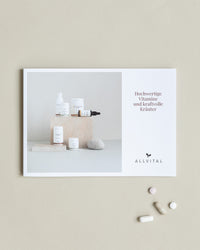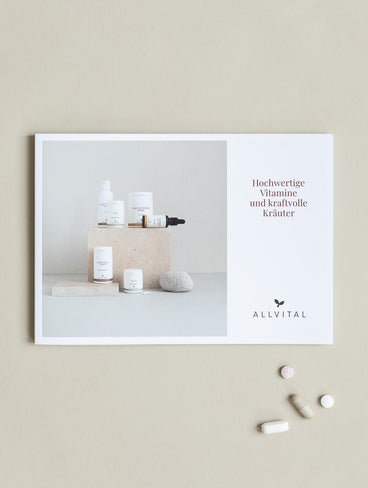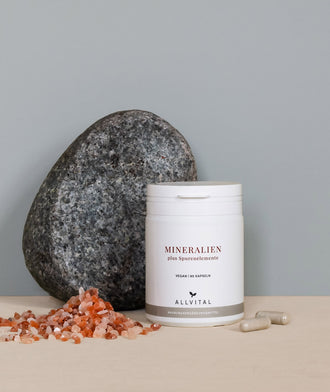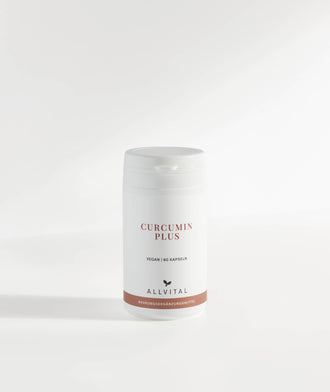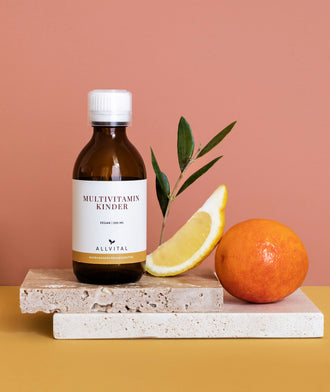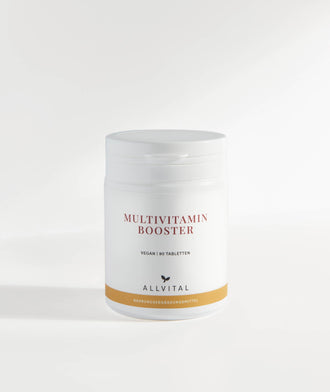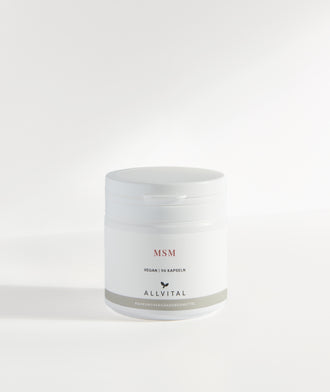
Beauty from within: Nutrients for skin, hair & nails
Youthful, fresh and clear skin; full looking and shiny hair and strong nails are considered a sign of beauty and contribute to our mental well-being.The appearance of our skin, hair and nails is not just an external feature, but also a reflection of the state and health of our body.
In addition to external care and protection against harmful environmental influences, a good supply of certain nutrients to the body is of great importance for maintaining healthy skin, hair and nails.
In the following, we would first like to give you a brief overview of the functions and structure of the skin, hair and nails and then introduce you to the most important nutrients that are needed to build and maintain them.
Skin - an organ with many tasks
As the direct barrier to the outside world, our skin is exposed to a variety of influences on a daily basis. For example, it protects the body from heat, cold, UV radiation, infectious agents and injuries.
In addition to its role as a "protective cover", the skin also fulfils numerous other functions:
• Sensory organ for the perception of pressure, temperature and pain
• Production of vitamin D
• Regulation of body temperature
• Storage of fat as an energy reserve
• Protection against excessive water loss
Structure of skin, hair and nails
The structure of the skin can be divided into the epidermis, the dermis and the subcutis.
The epidermis consists of a multi-layered epithelium, which is sealed off from the outside world by a “horny” layer. The epidermis renews itself continuously. One renewal cycle lasts approximately one month.
Beneath the epidermis is the dermis. This consists to a large extent of connective tissue fibres such as collagen and elastin, which ensure the firmness and elasticity of the skin.
Hyaluronic acid is also present in the dermis. Hyaluronic acid has a strong water-binding effect and therefore "plumps up" the skin in a natural way. The dermis also contains sebaceous and sweat glands, hair follicles, blood vessels and nerves.
The deepest layer is the hypodermis, which consists mainly of fatty tissue and loose connective tissue and contains numerous blood vessels and nerve fibres.
Hair and nails belong to the so-called skin appendages, as they are formed from specialised cells in the skin. Hair, nails and the horny layer of the epidermis consist primarily of the structural protein keratin.
How does the skin age?
The three skin layers change with increasing age. Among other things, there is a reduction in collagen and elastic fibres, a loss of water and fatty tissue, a deterioration in the blood vessel supply and a slowdown in skin metabolism. The skin increasingly loses its firmness and elasticity. It becomes increasingly looser, thinner and wrinkled.
Skin ageing is a natural process and cannot be prevented. However, the ageing process of the skin does not have to be rapid. Beautiful and healthy skin is not a question of age.
Lifestyle has an enormous influence on the health and ageing of the skin. An unhealthy diet, a lot of stress, lack of sleep, too little exercise, toxins in food and the environment, alcohol consumption, smoking, UV radiation and a lack of nutrients are important causal factors that can greatly accelerate skin ageing.
A key damaging mechanism is the formation of free radicals (oxidative stress) in the body. Free radicals are highly reactive substances that can attack cells and tissue components, such as protein structures, so that they can no longer fulfil their biological function. This process can expediate the development of diseases and premature ageing.
All the factors just mentioned increase the formation of free radicals in the body and therefore also in the skin.
Healthy skin, hair and nails
There are several things you can do to keep your skin young and healthy:
- Protect yourself from strong sunlight.
- Eat a healthy diet with plenty of fresh fruit and vegetables and avoid sugar, food additives, highly processed foods and too many animal products.
- Drink plenty of good quality water.
- Make sure you get enough sleep.
- Exercise every day.
- Reduce your stress levels.
- Choose food, household products and cosmetics that are low in harmful substances.
- Have existing health problems (e.g. intestinal health) treated holistically.
- Provide your body with all the macro and micronutrients it needs.
The rest of the text focuses on the last point in particular. We will introduce you to the most important nutrients associated with healthy skin.
Zinc - the all-rounder
The trace element zinc is involved in over 300 metabolic reactions. It acts as a co-factor (auxiliary substance) for enzymes, enabling them to function ( 1 ).
Zinc has a primary role in the correct process of cell division. In the skin, this is particularly important for the proliferation of keratinocytes. These are the horn-forming cells that are responsible for the formation of the protective horny layer of the epidermis and for the formation of hair and nails ( 1 ).
With a zinc deficiency, the skin surface is rougher and less resistant to the penetration of pathogens. Hair can appear more brittle, thinner and more fragile. Furthermore, brittle nails, nail bed inflammation, white spots and grooves on the nails are indications of a zinc deficiency (2).
Zinc is also crucial for the formation of collagen, for wound healing, for the function of the immune system and for the metabolism of vitamin A. It also acts as an antioxidant and can therefore protect skin cells from free radicals (1).
A zinc deficiency therefore promotes the progression of skin ageing by reducing the formation of collagen fibres and increasing exposure to oxidative stress. A weakening of the immune defence also favours infections.
As the body is unable to store zinc, it is essential to regularly consume sufficient amounts through food or dietary supplements ( 3 ).
Zinc from Allvital contains a combination of three organic zinc salts, all of which are highly bio-available and well tolerated.
Zinc is also contained in the Immune Complex preparation. Here it is combined with other antioxidants and the substance humicin, which can bind heavy metals in the intestine, among other things. Immune Complex is therefore ideal for strengthening the immune system and for skin health.
Vitamin C - powerful antioxidant and collagen booster
Vitamin C is a water-soluble vitamin that is particularly known for its strengthening effect on the immune system. Vitamin C is also a potent antioxidant and acts as a co-factor for various enzymes. For example, it is very important for collagen formation and therefore for the elasticity and strength of connective tissue ( 4 ).
A vitamin C deficiency therefore manifests itself in particular through a deterioration in the quality of the connective tissue. This favours the development of cellulite, stretch marks and wrinkles, for example, and leads to impaired wound healing. Vitamin C deficiency also reduces the body's defences against infectious agents.
A severe deficiency over several months can even lead to haemorrhaging in the skin and mucous membranes and loosening of the teeth. These are typical symptoms of the well-known vitamin C deficiency disease, called scurvy ( 4 ).
Vitamin C is contained in many of our food supplements. Our Vitamin C Complex supplement contains vitamin C from various natural sources in combination with the essential amino acid lysine and green tea extract. Among other things, lysine promotes the absorption of vitamin C and the product’s antioxidant properties are further enhanced by the green tea extract.
Vitamin A and beta-carotene - anti-ageing in many ways
Vitamin A is a fat-soluble vitamin that plays a crucial role in skin health and many other important processes in the body such as vision, immune function and cell differentiation ( 5 ).
Vitamin A is only found in animal foods. Instead, various vitamin A precursors exist in plant foods, which can be converted into vitamin A to varying degrees. The most important precursor is the carotenoid beta-carotene ( 5 ).
Vitamin A promotes the formation of collagen and elastin in the skin and supports cell renewal. It thus counteracts skin ageing in various ways. Vitamin A also regulates sebum production and can therefore be helpful in the treatment of acne.
Vitamin A can be applied to the skin in crème form or taken orally for these purposes.
A large proportion of beta-carotene is converted into vitamin A by the body. It also has a strong antioxidant effect and thus protects the cells of the skin from oxidative stress ( 5 ).
Vitamin A and beta-carotene can be found in our Multivitamin Basic and Multivitamin Booster products. These products combine 47 different vitamins, minerals, trace elements, amino acids and natural antioxidants. Multivitamin Booster contains twice the dosage of Multivitamin Basic.
Beta-carotene is also found in the powerful antioxidant blend Curcumin Plus.
Selenium - an important antioxidant
The trace element selenium is an important component of various antioxidant enzymes such as glutathione peroxidases. These enzymes are found in all cells of the body and protect against free radicals ( 6 ). Selenium is also important for the normal functioning of the immune system and for the activation of thyroid hormones.
A selenium deficiency can have a negative effect on the skin, hair and nails in various ways.
A reduction in antioxidant protection and a weakening of the immune defence system favours the occurrence of various diseases. Studies show, for example, a link between a selenium deficiency and the occurrence of psoriasis, various forms of acne and atopic dermatitis ( 7 ).
A lack of thyroid hormones, which can be linked to a selenium deficiency, also has negative consequences for the skin. For example, the production of sweat and sebum is reduced, making the skin rougher and drier.
Selenium is also important for maintaining healthy hair and nails. Reduced hair growth, brittle and thinning hair or hair loss as well as changes in the nails such as white spots can therefore be an indication of a deficiency of the trace element.
Selenium from Allvital contains high doses of sodium selenite and is therefore the ideal product for an existing selenium deficiency.
B vitamins - strengthened skin barrier
B vitamins are a large group of water-soluble vitamins that are involved in countless vital processes in the body. Of particular interest for skin health are biotin (vitamin B7) and niacin (vitamin B3).
Biotin is important for the formation of keratin, the most important component of the horny layer of the skin, hair and nails. Biotin strengthens the skin barrier and thus improves the hair and nails.
Niacin plays a role in the energy metabolism of skin cells and promotes the regeneration of skin and mucous membranes.
Vitamin B Complex from Allvital contains all 8 B vitamins in high-dose form. Biotin can also be found in combination with vitamin B12 and folic acid in our supplement: Vitamin B12 lozenge with folic acid, as these vitamins complement each other perfectly in their effect. Niacin is also available as a single ingredient in the form of niacinamide in our range.
Sulphur - formation of keratin and collagen
The mineral sulphur is important for the formation of structural proteins such as keratin and collagen and is therefore of great importance for the health of the connective tissue of the skin and for the formation of hair and nails. Sulphur is also important for the function of the immune system and, as a component of glutathione, contributes to the body's antioxidant protection.
The natural sulphur compound methylsulphonylmethane (MSM) is particularly suitable for supplementing sulphur.
Vitamin E - antioxidant mix
Vitamin E is a collective term for various fat-soluble substances that act as important antioxidants in the body. Vitamin E also protects unsaturated fatty acids in particular from damage caused by free radicals.
Our vitamin E complex contains all naturally occurring forms of vitamin E and can therefore make an ideal contribution to the antioxidant protection of the skin.
Hyaluronic acid - moisturising the skin
Hyaluronic acid is an important component of connective tissue and is found in the skin, cartilage, bones and synovial fluid. As hyaluronic acid has a strong water-binding capacity, it provides the tissue with moisture, elasticity and firmness.
Hyaluronic acid from Allvital is therefore ideal for counteracting the decreasing hyaluronic acid content with age.
L-lysine - important for collagen formation
The amino acid L-lysine cannot be produced by the body itself. It is therefore one of the essential amino acids. L-lysine is important for the function of the immune system and for the formation of collagen, among other things.
The Lysine Complex from Allvital provides you with a comprehensive amino acid preparation containing the amino acids lysine, proline and taurine. We have combined all 8 essential amino acids for you in the Amino 8 preparation.
Other important nutrients
The effect of nutrients is often very complex, meaning that our skin healthy is influenced by numerous other macro and micronutrients The list goes on and on.
Some further examples are
- Copper (preparation: e.g. minerals plus trace elements)
- Silicon (preparation: e.g. minerals plus trace elements)
- Omega-3 fatty acids (preparation: e.g. DHA plus EPA)
- Astaxanthin (preparation: e.g. Astaxanthin Plus)
- Quercetin (preparation: e.g. Quercetin-Phospholipid, Curcumin Plus)
Which product and how much should I take?
Due to the decreasing content of important nutrients in our food and the increased exposure of the body to environmental toxins, stress etc., the need for these vital substances is increasing. Many people today are no longer optimally supplied and can therefore benefit from taking nutritional supplements.
In order to select the ideal combination of products, it is advisable to have your blood values checked at regular intervals (e.g. every 6 to 12 months). A whole blood mineral analysis should be carried out to check the supply of minerals and trace elements. Furthermore, all vitamins, amino acids and the supply of various fatty acids can also be analysed in the laboratory.
Our combination preparations Multivitamin Basic, Multivitamin Booster, Multivitamin Kids and Minerals plus trace elements are particularly suitable for people who suffer from various deficiencies.
Sources
- Zou P, Du Y, Yang C, Cao Y. Trace element zinc and skin disorders. Front Med (Lausanne). 2023;9:1093868. Published 2023 Jan 17.
- Ward J. The effect of zinc on skin. Aesthetic Medicin [Internet]. [accessed on: 19 Dec 2023]
- Zinc. German Society for Nutrition [Internet]. [accessed on: 19.12.2023].
- Vitamin C. German Nutrition Society [Internet]. [accessed on: 19.12.2023].
- Vitamin A. German Nutrition Society [Internet]. [accessed on: 19.12.2023].
- Moghadaszadeh B, Beggs AH. Selenoproteins and their impact on human health through diverse physiological pathways. Physiology (Bethesda). 2006;21:307-315.
- Pincemail J, Meziane S. On the Potential Role of the Antioxidant Couple Vitamin E/Selenium Taken by the Oral Route in Skin and Hair Health. Antioxidants (Basel). 2022;11(11):2270. Published 2022 Nov 17.
